Since February 2024, Tigran Gambaryan, the head of financial crime compliance for Binance, has found himself in a precarious situation, detained in Nigeria. What began as a mission to address Binance’s alleged role in Nigeria’s economic challenges has spiraled into a diplomatic quandary. Initially accused of tax evasion and money laundering, Gambaryan saw the tax charges dismissed, yet the tug-of-war between Nigeria and Binance leaves his future hanging in the balance.
Why Gambaryan’s Detention is Alarming
The conditions of Gambaryan’s detention have significantly impacted his health. He has contracted serious illnesses such as malaria, pneumonia, and tonsillitis. Compounding these issues is a herniated disc that demands surgical intervention—something he has been unable to receive while incarcerated. Confined to a wheelchair and deprived of crucial medical care, Gambaryan’s lawyers have tirelessly sought bail, citing his worsening health, but the Nigerian judiciary has consistently denied these requests.
This dire situation has mobilized U.S. attorneys general, led by Utah’s Sean Reyes, to take decisive action. They have formally appealed to President Joe Biden and Secretary of State Antony Blinken, urging them to designate Gambaryan as a hostage. The letter starkly compares his plight to that of Otto Warmbier, the American student who met a tragic fate in North Korea.
What’s Really Going On?
The root of Gambaryan’s legal troubles lies in accusations that Binance played a role in destabilizing Nigeria’s currency. While the Nigerian economy has faced long-standing issues, largely due to systemic corruption and poor management, Binance has emerged as a convenient scapegoat. Gambaryan, along with another Binance executive, became the focus of these allegations. However, many, including U.S. lawmakers and humanitarian organizations, argue that his detention serves as leverage against Binance rather than a pursuit of justice.
His legal defense, spearheaded by attorney Mark Mordi, continues to vigorously advocate for his release. Despite their efforts, including a renewed appeal in September emphasizing his urgent medical needs, the legal process remains stalled without progress.
What to Expect Next
As Gambaryan’s trial resumes on October 25, the uncertainty surrounding his health and the absence of independent medical evaluations make predicting the outcome a challenging endeavor. The U.S. government has largely kept its response discreet, yet there are indications of ongoing diplomatic efforts behind the scenes. The mounting pressure on both Nigeria and the White House makes this case a focal point of international attention.
The forthcoming weeks could prove pivotal in determining Gambaryan’s fate and whether the U.S. government will intensify its efforts to secure his release. The unfolding developments promise to be a defining moment in this complex saga, with wide-ranging implications for international relations and justice.











